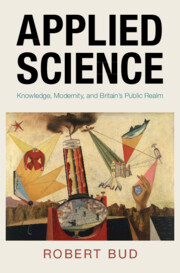Introduction
The Biography of a Concept
Published online by Cambridge University Press: 15 March 2024
Summary
Remarkably, the classification of science is only now being studied historically. The introduction specifies this book’s question: What made applied science seem such a potent economic, cultural, and political elixir in the United Kingdom for many decades and then saw it superseded? The book explores the meaning of the term that gave it such potency using five tools: institutions, narratives, sociotechnical imaginaries, concepts, and ideologies. The term has epistemic connotations; it has been promoted and blamed for its science policy implications, and cultural reality once weighed heavily. The book explores the relationship between ‘applied science’ and ‘technology’ with their different emphases to describe the space between pure science and the market. The argument has three parts: the nineteenth-century concern with pedagogy, the early twentieth century as attention shifted to research, and the period after World War Two in which the visibility of applied science first rose and then collapsed.
Keywords
- Type
- Chapter
- Information
- Applied ScienceKnowledge, Modernity, and Britain's Public Realm, pp. 1 - 16Publisher: Cambridge University PressPrint publication year: 2024

